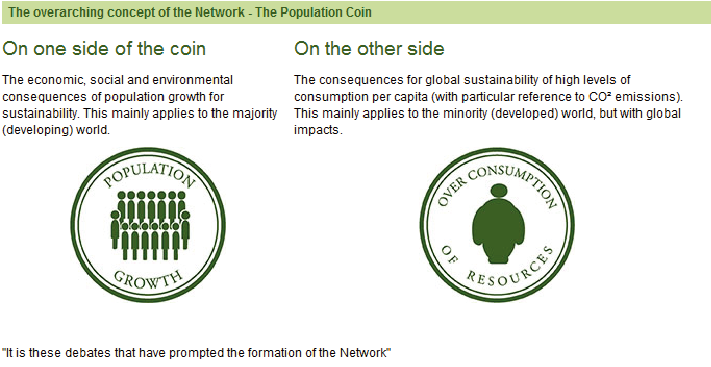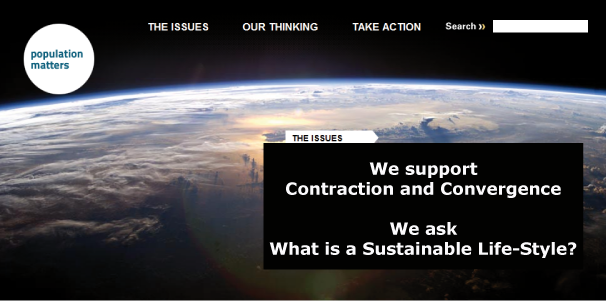Dear Aubrey
Yes, I am a strong supporter of Contraction and Convergence in its principle and practical outworking as explained via the links you sent, below - and hence of the Proposal to be submitted the UN Framework Convention on Climate Change, by GCI.
Without detracting the tiniest bit from this support, however, I would point out that the future of the planet will still be prejudiced through climate change if population growth continues unremittingly. I.e. even an actual - agreed - and fair - and low - mean per-person emission rate, will not avert catastrophe if there are ever more persons!
Somehow we must get it fully recognised at Rio+20 that meeting women's needs and removing the barriers to women for the CHOICE to control their fertility, in a rights-based framework, is a sine qua non of success for sustainability of all life on the planet (and the extra reason is the additional threats such as energy, food and water scarcity and biodiversity collapse, over and above climate change).
Sustainable GROWTH, promoted by population growth, is an oxymoron. Hardly rocket science....
Warm regards
John
"We have not inherited the world from our grandparents - we have borrowed it from our grandchildren"
John Guillebaud
Emeritus Professor of Family Planning and Reproductive Health, UCL
14 Hid's Copse Road
OXFORD OX2 9JJ
Population and Sustainability Network
Population Matters
Environment Time Capsule
Contraction and Convergence
Climate change is driven, and its impacts are experienced, to different extents by different populations across the globe. Total emission figures mask a huge heterogeneity in per person energy consumption which varies widely both within national borders and between them. Equity, including equality of opportunities for development, must therefore be the central pillar around which climate change policy is developed. In response to these discrepancies, ‘Contraction and Convergence’ presents a framework in which finite bio-spherical capacity is equitably shared amongst all of the earth’s inhabitants, thus placing the importance of per capita emissions centre stage. This framework recognizes the right of the developing world to develop economically, and that their per capita emissions will rise as a result. On the other hand the emissions of the developed world will have to contract, with the overall objective of arriving at an equitable global per capita emission level. Population growth is fundamentally relevant to this model, since total population size will largely determine the cap at which total safe emissions can be set. Again the complexity of this issue is crucial to grasp: in the short term, it will be in the interests of individual countries to have large populations to capture as large a share of the global emissions as is possible. At the global level the reverse is the case; the larger the global population, the smaller the per capita global emission level will be.PSN will promote increased understanding of the links between population and climate change and advance approaches, such as contraction and convergence, which mirror the PSN ‘Population – Consumption Coin’ concept by recognizing the twin rights and responsibilities of the developed and developing worlds.
The Population and Sustainability Network
"Humanity as a whole is already consuming more resources than the earth can in the longer term provide. Therefore consumption in the richer countries will have to be reduced to allow those in poorer countries to attain a decent lifestyle. Consumption will inevitably grow in developing countries as they industrialise and urbanise, even if they take on board the need for sustainable lifestyles. It will be up to wealthier communities, principally in developed countries, to moderate their lifestyles and adopt consciously green practices. We already know that what one country considers acceptable would be considered far from acceptable to another. How should the level be set? By whom? On what criteria? The concept of Contraction and Convergence (C&C) was conceived by the Global Commons Institute in the early 1990s. The principle is that the rich should consume progressively far less resources per capita than before, while the poor consume rather more than they did, so we converge towards a common ‘fair share’ for each, which the planet can sustain. We support this principle of C&C or global equity, but it must take account of the plain arithmetic fact that every additional person reduces everyone else’s sustainable share. We have therefore insisted on including a population base year at which the ultimate target figures, notably for sustainable carbon emissions per person, should be calculated country by country. Without it, countries with high population growth would consume ever more, at the expense of those who had succeeded in restraining or reducing their numbers. We were delighted when Kofi Annan endorsed our view in his Chairman’s Key Recommendations following a conversation we had with him after a workshop we gave at the Global Humanitarian Forum in June 2009."
The concept of Contraction and Convergence (C&C) was conceived by the Global Commons Institute in the early 1990s. The principle is that the rich should consume progressively far less resources per capita than before, while the poor consume rather more than they did, so we converge towards a common ‘fair share’ for each, which the planet can sustain. We support this principle of C&C or global equity, but it must take account of the plain arithmetic fact that every additional person reduces everyone else’s sustainable share. We have therefore insisted on including a population base year at which the ultimate target figures, notably for sustainable carbon emissions per person, should be calculated country by country. Without it, countries with high population growth would consume ever more, at the expense of those who had succeeded in restraining or reducing their numbers. We were delighted when Kofi Annan endorsed our view in his Chairman’s Key Recommendations following a conversation we had with him after a workshop we gave at the Global Humanitarian Forum in June 2009.






